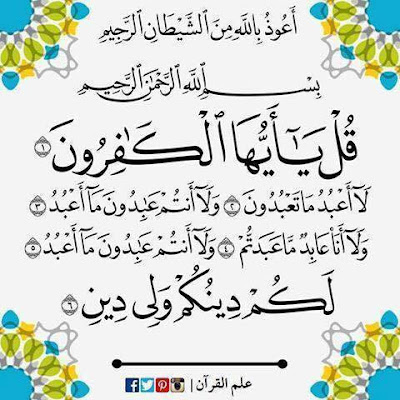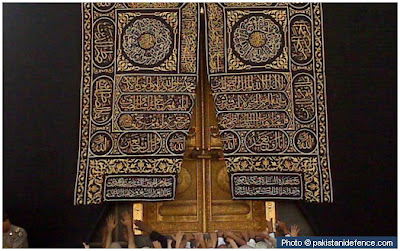
The above enclosure, at the foot of Mount Uhud contains in the centre the graves of Hamza (r.a.), Abdullah bin Jasht (r.a.) and Mus’ab bin Umair (r.a.) who were all martyred in the Battle of Uhud. The rest of the martyrs of Uhud are buried behind this enclosure.
- Hamza ibn Abdul Muttalib was one of the finest huntsmen and greatest warrior of the Arabs. In the battle of Badr, he had killed many of the Qurayshi nobles and now he cut his way through their ranks like a mighty wave sweeping all before it. One of the Qurayshi nobles had a black slave called Wahshi from Abyssinia (present Ethiopia) who could use the javelin with great skill. Hind, the wife of Abu Sufyan, promised Wahshi freedom and his master Jubayr bin Mut’im also promised him the same as Hamza (r.a.) had killed his uncle in Badr. Wahshi prowled amongst the fighters until he saw Hamza (r.a.). He says, “I held my spear and balanced it well, then I aimed it. It entered into his abdomen and went out the other side. I waited until he was dead, then I took my spear and went to wait in the camp. I had no quarrel with anyone. I killed him only to be set free.” Wahshi later on in life became a Muslim and killed Musailimah, the imposter who claimed Prophethood after the demise of the Prophet Muhammad (s.a.w.).
- When the tide of war turned towards the Quraysh, the women of Quraysh, led by Hind, whose brother, uncle and loved ones had been killed in Badr began to mutilate the Muslim dead. She particularly vented her fury on the body of Hamza (r.a.), cutting off his nose and ears, making a slit in his chest, taking out his liver, chewing it but unable to swallow it. The Prophet (s.a.w.) was greatly grieved when he came upon the body of his beloved uncle. Years later, when Makkah lay open at his feet, he gave all its inhabitants, including Hind a free pardon. Hind subsequently accepted Islam.
- Mus’ab (r.a.) held the flag of Islam. When the Muslims on meeting defeat were dispersing in confusion, he held the flag and stood at his post like a rock. An enemy came and cut his hand with a sword, so that the flag might fall and the defeat might be accomplished. He at once took the flag in the other hand. The enemy then cut the other hand also. He held the flag to his bosom with the help of his bleeding arms. The enemy at last pierced his body with an arrow. He fell dead and, with him fell the flag that he had not allowed to fall while he was alive. Another Muslim ran and took over the flag. At the time of his burial, he had only one sheet to cover his body. This sheet was too short for his size. When it was drawn to cover the head, the feet would be exposed, and when it was drawn to cover the feet, the head would become uncovered. The Prophet (s.a.w.) said:
“Cover his head with the sheet, and his feet with the ‘Azkhar’ leaves.”
- Around sixty-five Ansar and four Muhajirun were honoured with martyrdom while there were twenty-two fatalities among the polytheists.
- The Jews kept waiting the outcome of the battle in their safe dwellings. Mukhairiq, a person amongst the Jews told his people that they must lend support to Prophet Muhammad. “We can’t fight for this is Saturday,” they replied. He said, “This is the fighting between the Prophet and the disbelievers, so Saturday can’t stand in the way.” He took his sword and pronounced that in case he was killed, all of his property should be given to Muhammad (s.a.w.) and non should go against him. He joined the battle and was killed. When the Prophet (s.a.w.) came to know of this, he remarked, “He was the best of the Jews.”
- The Prophet (s.a.w.) instructed the martyrs to be buried still covered with blood, in the condition that they had fallen. Two or three of the martyrs were buried in a single grave. In some cases, he directed his Companions to shroud the martyrs in pairs. The martyr who had learned more of the Qur’an was lowered in the grave first. Paying tribute to their sacrifice in the cause of Allah, the Prophet (s.a.w.) said, “I shall be a witness unto them on the Day of Resurrection.”
- As they retrieved the bodies of their martyred brothers, the people came upon the body of Hanzlah bin Abu Amer (r.a.) above the earth with water dripping from it. The Prophet (s.a.w.) explained to his men, “The angels are bathing him.” Apparently, the newly married Hanzlah had just consummated his marriage when the call for Jihad was made. Without even stopping to bathe, he left his bride and rushed into the battlefield. Hanzlah fought heroically and was martyred, so the Prophet (s.a.w.) explained that the angels were bathing him to purify his body. Hanzlah was forever remembered as “Ghaseel Al-Malaaika” (one bathed by the angels).
- The Prophet (s.a.w.) used to visit the graves of the martyrs of Uhud and thus it is sunnah to also visit them. However, care should be taken not to engage in any innovative or non-Muslim practices such as supplicating to the martyrs, throwing letters or money into the graveyard, the tying of threads or tawaf.
Mount Dhubab (also known as Mount Ra'yah) is where a famous miracle took place during the digging of the trench. The Prophet (s.a.w.) struck a large rock which was reduced to pieces and emitted a light. Upon this the Prophet (s.a.w.) gave the Muslims the glad tidings of the coming victories over Syria, Persia and Yemen.
Masjid Ra'yah (masjid of the flag) is situated on the top of Mount Dhubab. During the digging of the trench (Khandaq) the tent of the Prophet (s.a.w.) was pitched at this spot.
This masjid is where the Prophet Muhammad (s.a.w.) made dua (supplication) for during the Battle of Ahzab and where Allah (swt) sent him the glad tidings of victory.
- Jabir (r.a.) reports that the Prophet (s.a.w.) made dua for three days (after the ritual prayers).
- From amongst his supplications were:
“O Allah, Revealer of the Book, swift in taking account, turn the confederates to flight, O Lord defeat them and cause them to quake.”
There is no God but Allah, the One who Conferred upon His armies the honour of victory and helped His servant and routed the confederates alone; there is nothing after that.”
- Allah (swt) answered the call of His Messenger and on Wednesday Jibraeel (a.s.) was sent to give him glad tidings of victory. The masjid marks the spot where this happened. Fatah is arabic for victory.
- Masjid Fatah is also known as Masjid Ahzab and Masjid A’la. A masjid existed here at the time of the Prophet (s.a.w.).
- Masjid Fath is one of the group of masjids known collectively as Masaajid Sab’ah (The Seven Mosques), the others being Masjid Salman Farsi, Masjid Ali, Masjid Umar, Masjid Sa’ad, Masjid Abu Bakr and the seventh is Masjid Qiblatain. Some of these masjids have now been dismantled.
The above picture shows the land on which the Prophet (s.a.w.) planted three hundred date palms to free Salman Farsi (r.a.) from slavery. It is located close to Masjid Quba.
- Salman the Persian (r.a.) came to the Prophet (s.a.w.) to seek his counsel and his help. His master, a Jew of the Bani Quraysah, kept him so hard at work on his property south of Madinah that he had never been able to have close contact with the Muslim community. It had been out of the question for him to be at Badr or Uhud or take part in any of the lesser forays which the Prophet had led or sent out during the last four years.
- He had asked his master what it would cost to set him free, but the price was far beyond his means. He would have to pay forty ounces of gold and plant three hundred date palms. The Prophet told him to write his master an agreement to pay the gold and plant the trees. Then he called on his Companions to help Salman with the palms, which they did, one contributing thirty palm-shoots, another twenty, and so on, until the full number had been reached. “Go dig the holes for them Salman,” said the Prophet, “and tell me when thou hast done, and mine is the hand that shall put them in.” The Companions helped Salman to prepare the ground, and the Prophet (s.a.w.) planted each of the three hundred shoots, which all took root and thrived.
- As to the remainder of the price, a piece of gold the size of a hen’s egg had been given to the Prophet (s.a.w.) from one of the mines, and he gave it to Salman, telling him to buy himself free with it. “How far will this go towards what I have to pay?” said Salman, thinking that the price had been greatly underestimated. The Prophet (s.a.w.) took the gold from him and putting it in his mouth he rolled his tongue around it. Then he gave it back to Salman, saying: “Take it, and pay them the full price with it.” Salman weighed out to them forty ounces from it, and so he became a free man.
Masjid Mustarah is where the Prophet (s.a.w.) rested and prayed after the battle of Uhud. The meaning of Mustarah is to ‘take rest’.
- This site was an important strategic location for the security of Madinah.
- Whenever the Prophet (s.a.w.) used to visit the grave of Hamza (r.a.) and the other martyrs of Uhud he used to take rest here.








Comments
Post a Comment